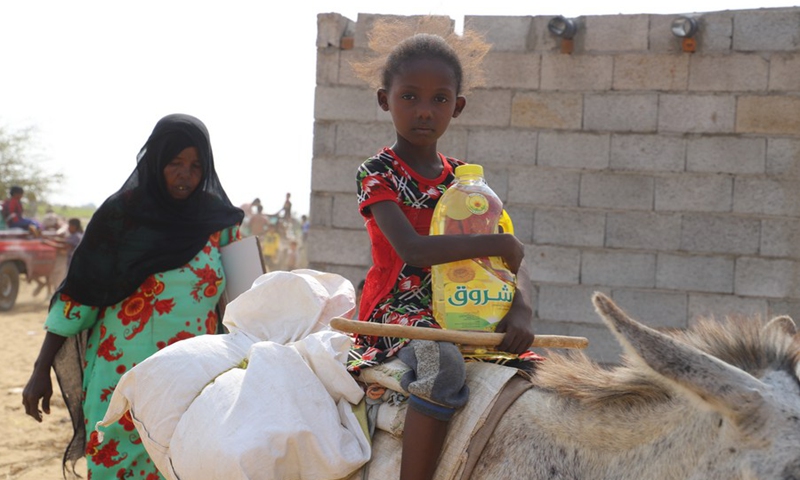
A child receives food from a charity group in Hajjah province, Yemen, March 4, 2021.(Photo: Xinhua)
UN Undersecretary-General for Humanitarian Affairs Mark Lowcock on Tuesday called for measures to mitigate the economic woes in Yemen, including direct foreign exchange injection.
The economic collapse is a major driver of the ongoing expansion of the potentially huge famine in Yemen. The economic collapse also fuels instability, said Lowcock.
There are two straight things to mitigate the dire status of Yemen's economy: to strengthen the currency by injecting foreign exchange, and to lift the blockade on the import of fuel, he told the Security Council in a briefing.
The Yemeni rial slipped again into an alarming depreciation in recent months, which means more people can no longer afford food or other essential items, he said. "We know in the past the provision of foreign exchange has stabilized the currency. And we know we can do it again."
Lowcock said that he had discussed this in detail with the Yemeni prime minister and other officials, and that the Yemeni government needs help in this area. He urged Yemen's partners to address this request with the seriousness and the importance it deserves.
The other issue to be addressed relates to the blockade of the commercial imports, especially the decision by the government of Yemen and others not to allow fuel into Hodeidah port, said Lowcock.
Fuel is essential for transporting food, pumping water or keeping hospitals open. Fuel prices have doubled or tripled in some areas as a result of the desperate shortages, which also pushed up prices of food, health care and everything else, he said.
Now, the Yemeni government has blocked all commercial fuel imports to Hodeidah through which more than half of Yemen's fuel imports come. Right now, 13 fuel ships are waiting outside Hodeidah, carrying enough supplies for two months. On average, these ships, all of which have been inspected and cleared by the UN Verification and Inspection Mechanism, have been waiting more than 80 days for government clearance, he said.
The origins of this problem are between the Yemeni government and the Houthi rebels over revenue. But the consequences of this are not borne by those making the decision. The consequences are borne by ordinary Yemenis. And this again contributes to the protractive process of prolonged starvation, said Lowcock.
He said the United Nations has failed to raise enough funds for humanitarian operations in Yemen. A pledging event for Yemen on March 1 secured 1.7 billion U.S. dollars, less than half of what is need for this year's response plan.
He also voiced concern over the Houthi offensive in Marib governorate as well as escalation in Taizz, Hodeidah and Hajjah.
The parties need to engage in the peace process again and in order to do that Houthi rebels must stop the dangerous Marib offensive. The fuel blockade on Hodeidah needs to end, and other commercial goods must let in. Yemen needs a nationwide cease-fire and a return to the political process, he said.
